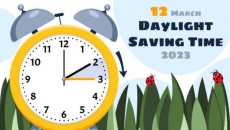OTTAWA - A new poll suggests most Canadians feel they're less safe now than they were before the COVID-19 pandemic, and most think the provincial and federal governments are doing a poor job of addressing crime and public safety.
In an online survey, Leger and the Association for Canadian Studies asked how the level of crime and violence in a respondent's home community today compares to how it was before the pandemic began in early 2020.
Nearly two-thirds of those who took the survey said they feel things are worse — with 32 per cent saying crime and violence has gotten "much worse" and 32 per cent saying it is "a little worse."
A quarter of respondents said the situation hasn't changed, and eight per cent said they don't know. Just two per cent of people said the situation is "a little better."
Women living in urban areas were more likely to report that things are worse today.
Those in B.C. were most likely to say crime and violence are worse since the pandemic hit, at 72 per cent, while people in Quebec were least likely to say so, at 54 per cent. Quebecers were most likely to say things have not changed.
However, when asked whether they experienced, witnessed or knew someone who experienced a series of unsafe situations — from vandalism to theft to physical assault — a large majority of respondents said they didn't.
The most common type of unsafe situation people reported was "aggressive behaviour," which the survey identified as issuing threats, yelling or causing someone to fear for their safety. Of those surveyed, 20 per cent said they'd experienced such behaviour and 19 per cent said they feared for their safety at least once in the last six months.
Five per cent of respondents said they were the victim of a physical assault, and five per cent said they were the target of a hate crime, while 20 per cent said they knew someone who had been assaulted and 17 per cent said they knew the victim of a hate crime.
According to the most recent data from Statistics Canada, overall police-reported crime rates were virtually unchanged in 2021 as compared to 2020, the first year of the pandemic.
Non-violent crime, including break-ins, thefts and robberies, declined in both 2020 and 2021.
In contrast, violent crime rose by five per cent in 2021, mostly because of a 27 per cent increase in hate-motivated crimes and higher rates of reported sexual assault.
Incidents of harassment and threatening behaviour have been steadily increasing since 2017, StatCan says, and there was notable growth in this type of report since the onset of the pandemic.
More than half of those polled by Leger said they think law enforcement and their city or municipality are doing a good job addressing the issue of public safety, but only 39 per cent said the same about their provincial government, and just 33 per cent gave the federal government a passing grade.
People over the age of 55 and those living in Quebec were most satisfied with law enforcement, while fewer than half of Atlantic Canadians felt police were doing a good job.
Ontario residents were least satisfied with the performance of their provincial government, and people from Manitoba and Saskatchewan were least happy with the federal government.
The survey also asked whether stricter gun control would make people feel more safe. It found that 47 per cent of respondents said that would make them feel safer, and 42 per cent said it wouldn't change how they feel.
Statistics Canada data show that the number of Criminal Code firearm offences across the country has been on the rise for years, including during the pandemic.
Asked for their opinion about a list of actions to make communities safer, respondents overwhelmingly called for tougher penalties for people found guilty of committing violent offences and for better mental health supports, with those options getting 81 per cent and 79 per cent support, respectively.
Three-quarters of those polled said more police would help, and 72 per cent said addressing the housing crisis would make communities safer.
In total, 1,517 people took the survey between April 6 and 10. The poll cannot be assigned a margin of error because online surveys are not considered truly random samples.






